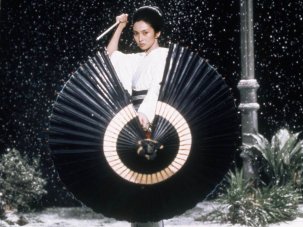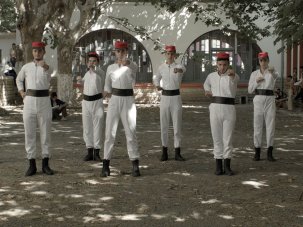Wrath of Silence
What’s it about
When his son disappears, a mute man returns to his village to search for the child. A natural born bruiser, he soon finds himself in trouble with the local corrupt mining goons. Could their sadistic boss hold the key to finding the boy?
Who made it?
This is director Xin Yukun’s second feature following 2014’s Coffin in the Mountains, which received plaudits, including the grand prize at Warsaw International Film Festival, for its bold narration and subtle sense of black humour. Handy with a sword, lead actor Song Yang has appeared in several martial arts films, including The Final Master in 2015, which won a Golden Horse Award for best action choreography, and Wrath of Silence’s meat-obsessed kingpin is played by Jiang Wu, known to many as the lead in Jia Zhangke’s A Touch of Sin.
What’s special about it?
It’s a film of contrasts: its thrills hit hard in a series of muscular, pulpy fight scenes, but it also has a confident sense of pacing, slow-burning its way through a story filled with striking visuals and an atmosphere of rising dread. Our hero’s farming village is an arid landscape scarred by rapacious mining, while the kingpin’s stylised lair is a baroque enclave, whose design wouldn’t be amiss in a Park Chan-wook film. A dry black humour permeates, while an undertow of rage – against corruption and exploitation – is never far from the surface.
Following its debut as the closing night film in the FIRST Youth Film Festival in Xining, China, which is often a cool showcase for new filmmakers (and where his previous film won best film and best director), the LFF is delighted to be screening the international premiere of Wrath of Silence, a thrilling discovery from a major talent.
See this if you like…
Jia Zhangke, Park Chan-wook, David Fincher
The White Girl
What’s it about?
A trio of misfits bond in Hong Kong’s last remaining fishing village. A Japanese artist finds an abandoned camera obscura, a teenage girl questions what happened to her absent mother, and a scrappy street boy susses out the plans of some nefarious developers. The White Girl is a sumptuous tale of dreamers and resistance.
Who made it?
This is the debut fiction feature from director Jenny Suen, an artist and filmmaker who has made short films for international brands such as Diesel and Vice, featuring actors including Chloe Sevigny and Zosia Mamet. The White Girl is co-directed by legendary cinematographer Christopher Doyle (In the Mood for Love, Hero, Paranoid Park), with whom Suen collaborated on their documentary Hong Kong Trilogy, an experimental city portrait using the voices of three generations of Hong Kong people.
What’s special about it?
With Christopher Doyle lensing, the film’s lush cinematography will come as no surprise, but The White Girl’s charm extends across the visual realm – via impeccable production design and costume work – and beyond, creating an intoxicating film rich with textures: silk and pearls, rusty mirrors, salty caves, kinetic sculptures. Top this off with a humorous sensibility, a love of pop music and a sense of magic, and you have an often-astounding and always-sensuous experience.
See this if you like…
Tactile cinema, Terrence Malick, ASMR, Wong Kar-wai, Last Life in the Universe
Life Imitation
What’s it about?
A hybrid documentary like none you’ve seen before, fusing observation, chat apps and video-game footage to build an edgy portrait of urban youth, Life Imitation channels the constant performance anxiety of technology-mediated lives.
Who made it?
Chen Zhou is a young Chinese artist who has worked in video installation and painting. His work is concerned with “abusive external forces interacting aggressively with the individual, and trying to expand the understanding of the strategies hidden behind the media and the organs of power”.
What’s special about it?
“All this new technology
will eventually give us new feelings
that will never completely displace the old ones,
leaving everyone feeling quite nervous
and split in two.”
– extract from ‘Self-portrait at 28’ by David Berman
One of two films in this year’s LFF that use footage from Grand Theft Auto to amplify a sense of alienation (the other being Martin Cries in Short Film Competition), Life Imitation draws connections between the physical isolation of gameplay, the moral void of GTA’s universe and the sense of displacement felt by women discussing the role of performance in their offline sex and relationships. It’s a film that casts a lingering spell, where you can feel a new filmmaking language being developed, and it won the New: Visions Award at CPH:DOX.
See this if you like…
The Human Surge, J.G. Ballard, the future of cinema















